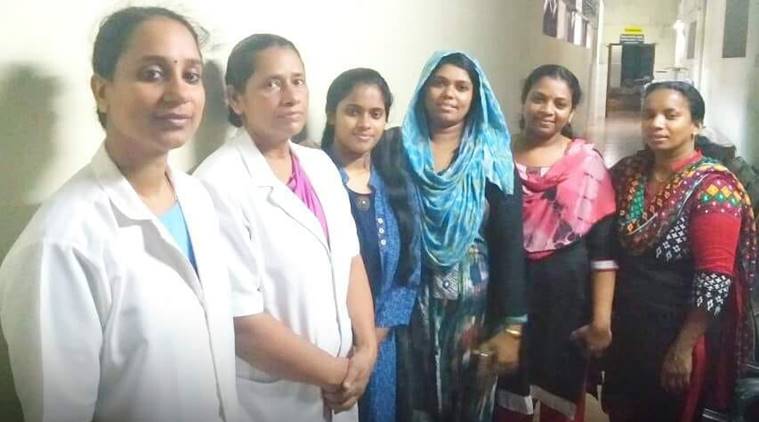 Ajanya is third from the left.
Ajanya is third from the left.
Ajanya M is not just any other 19-year-old; she represents one half of the 10 per cent of those who contracted the deadly Nipah virus infection in Kerala and survived. Simply put, out of 18 people who contracted the virus, Ajanya is one of the two who lived to tell the tale.
A native of Koyilandy in Kozhikode district, the 19-year-old was pursuing a degree in nursing when she contracted the virus in the first week of May reportedly from a patient at the casualty ward of the Medical College Hospital. The outbreak hadn’t happened then and nobody even knew of such a viral infection, whose natural hosts are considered to be fruit-bats.
A few days later, “I started running a temperature and developed a headache following which I visited the Medical College on May 14. At that time, we just thought it was a monsoon-related fever,” she told indianexpress.com over the phone. When the pain didn’t stop, she was promptly admitted to the ICU of the Medical College and when doctors noticed that her symptoms showed signs of encephalitis, they sent her fluid and blood samples for confirmation. Frighteningly for Ajanya, the tests came back positive.
“When I was actually sick, I was not aware of the seriousness of the situation because I was unconscious throughout my stay at ICU. I had gone in thinking it was just any other fever. It was my parents and relatives who went through the most emotional distress because every day they were receiving reports of people dying of the virus,” said Ajanya, looking back. True, as Ajanya spent her days, first in the ICU and then later in the isolation ward of the hospital, people kept dying of the virus every day, sometimes just 50 or 100 feet from her. Since the infection spreads rapidly through the human body, chances of survival were bleak and depended highly on how early they were brought in for medical care.
For close to two weeks, she was subjected to intensive support care in the ICU post which she was shifted into an isolation ward on May 31. By then, the basic encephalitic symptoms had weakened and signs of recovery were imminent. “By the time I was moved into the isolation ward, I had gained consciousness; it was then that I was filled in on the nature of the sickness that I had contracted. It was surreal to even imagine how close I was to death,” she said.
Ajanya’s parents Sreedharan, a daily-wage labourer, and Vijitha, an ASHA worker were her pillars of support sitting alongside her day and night as she battled the infection.
“I honestly believe that it was the untiring effort of the nurses and the doctor at the medical college, along with the prayers of my parents, relatives and friends that saved me.” Her mother, Vijitha chimed in, “Doctors told us to pray to God. That’s the only way so we kept praying for her to get better.”
Ajanya was discharged from the hospital earlier this week with her relatives and friends turning up in large numbers to accompany her home. Following an advised rest period of one week, she is set to go back to college soon.
As for her future ambitions, Ajanya’s goal remains unchanged. “I want to go ahead and become a nurse. I understand that being in contact with various health hazards will become commonplace in my job, and I am ready to accept that risk.” Coming this close to death has emboldened her, she said; it has made her realise that if death could be conquered, anything else coming her way would be a cakewalk in comparison.
(Written by Prajna Unikkumarath, she is an intern with indianexpress.com)